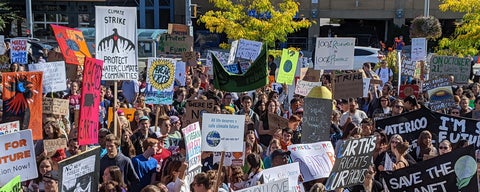Turbulent times like ours call for people who understand systems of violence and conflict, and who are prepared to build peace with justice. This involves identifying and transforming systems of violence, marginalization, and oppression, including racist, gendered and colonial violence at home as well as around the world. Whether working locally or globally, Peace and Conflict Studies is committed to imagining, educating, and ongoing learning that equips our graduates to pursue justice and peace.
PACS as a department is located on territory that is governed by the Dish with One Spoon Wampum and land promised to the Six Nations Confederacy in 1784 as part of the Haldimand Declaration. For more information, see Conrad Grebel University College's land acknowledgement and read about decolonization at the University of Waterloo's Office of Indigenous Relations.
Why Study Peace and Conflict Studies (PACS)?
Learn diverse ways to promote peace, equitable justice, and social change through a vibrant interdisciplinary program that combines the study of history, political science, sociology, and psychology to understand better the causes and impact of interpersonal, communal, and international conflicts and violence in different societies. You will explore theory, research, and practice in classes taught by leading peace and justice scholars and practitioners. As an arts student, you will bring a unique perspective and set of skills to peace and conflict studies. Your creativity, critical thinking, and empathy can help contribute to finding new and innovative solutions to the complex challenges of peacebuilding and conflict resolution.
Take courses on conflict mediation, non-violent social change, gender and peacebuilding, religion and culture, environment, community transformation, human rights and social justice, refugees and forced migration, negotiation strategies, trauma, healing, and restorative justice.
Prepare to become a peace practitioner, community leader, or entrepreneur in conflict management programs or work with community and international development organizations, education systems, law firms, social services, refugee resettlement program support agencies, and more after graduation.
Who are PACS graduates?
PACS graduates have gone into many careers and used their training in different ways.
To learn more about what students can do after they graduate from PACS, check out our alumni profiles
News
Peace and Conflict Studies students visit the United Nations in New York City
"It's hard to describe, but it hit me right in the heart. I just thought, sometimes things can look one way, but then with a little more context or information, it can completely change your perspective," reflected Nancy Williams(last to the right) on a statue she saw at the United Nations Headquarters in New York City during a multi-day student seminar hosted by Mennonite Central Committee. The statue, pictured on the left, was recovered from the 1945 Nagasaki bombing. "How can something look so perfect from one side but then on the other side, you know there's just absolute tragedy?"
Lorena Rodriguez: On Outreach, Advocacy, and Inspiring Others
“I have this personal mantra, which is that information needs to serve for transformation,” says Lorena Rodriguez (‘15), a graduate of the Master of Peace and Conflict Studies (MPACS) program. Specializing in peacebuilding communication in humanitarian and development contexts, this mantra serves her well: the transformative power of outreach, advocacy and public policy to create meaningful change in complex environments and vulnerable communities is precisely what drives Lorena’s work.
Sage Streight: On Seeking Justice and Understanding in Law
Peace and Conflict Studies (PACS) alumni Sage Streight looks back on her time as a PACS student fondly, and the program’s teachings continue to inform her work today. After graduating from the University of Waterloo in 2019, with a major in PACS and a minor in Legal Studies, Sage pursued a law career. She graduated from the University of Ottawa’s law school in 2023 and by 2024, she was a fully licensed lawyer. She now works as a criminal prosecutor and assistant crown attorney in Kingston, Ontario.













